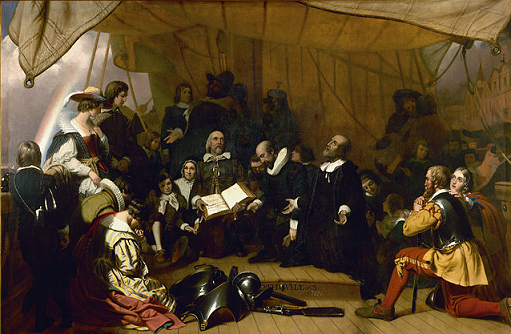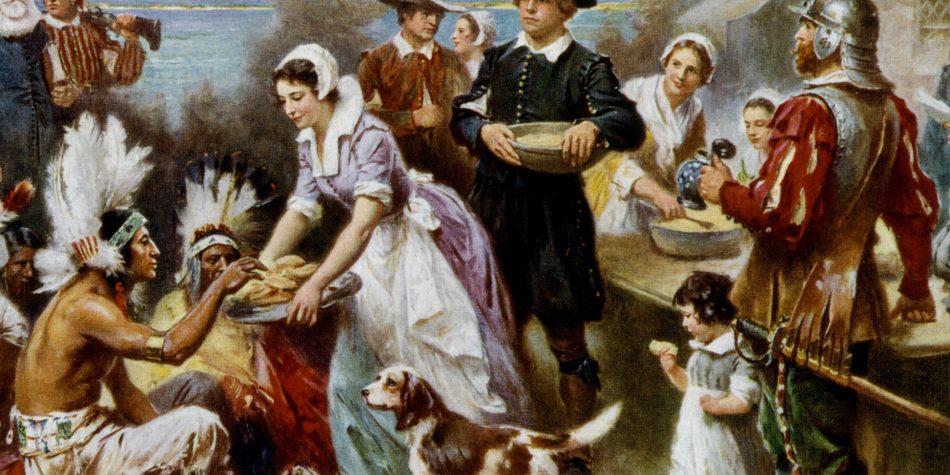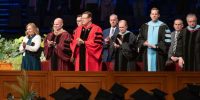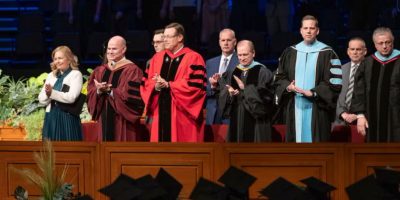In mid-August of 2018—weeks before the Church’s semi-annual October General Conference—President Russell M. Nelson released a public statement.
It reads: “The Lord has impressed upon my mind the importance of the name He has revealed for His Church, even The Church of Jesus Christ of Latter-day Saints. We have work before us to bring ourselves in harmony with His will.”
For me, the statement conjures up a prior scene on the stage of Christian history—one I wrote about publicly for the Deseret News right after that initial announcement:
Four centuries back, in Holland, a small band of English-born Christians listened to the parting words of their longtime pastor John Robinson. They were headed to “new England” and Robinson was staying behind. In his moving farewell address, Robinson expressed concern over the group’s nickname “Brownists.”
Robert Browne had been an English separatist whose attempts to set up a church based on New Testament teachings fizzled in the late 16th century. Although Browne eventually went back to the Church of England, his name stuck to anyone seeking for Christ’s church beyond the Anglican tradition.
Brownist was a label. An epithet. And a punchline.
Indeed, it was Shakespeare who would settle on “Brownists” as a category of people, nearly as despised as politicians, that he could have his “fool” poke fun at in his play “Twelfth Night.”
“I had as (willingly) be a Brownist,” says Sir Andrew Aguecheek, “as a politician.”
Fast forward to today, and the Book of Mormon musical is, perhaps, one more sign that you can still sell a few punchlines at the expense of the religious.
The pastor John Robinson, speaking to his band of separatists, believed that his “poor despised Church of Christ” was not so different from those other “Churches of Christ.” Robinson called on his followers, who had been maligned as “Brownists” to “study union (rather) than division” with regard to the many other reformed faiths of his day.

They were dismissed by many as “Brownist,” but they knew themselves to be Christ’s Church. Today, of course, we know them as the Pilgrims.
Mention of the Pilgrims today evokes Rockwellian scenes of perfectly cooked turkeys and cartoon top hats and buckles. But, the persecuted separatists were a religious minority, struggling to negotiate their identity, God’s will, and their place within a society and a world that was not always accommodating.
Sound familiar?
In the momentous years that followed, the Pilgrims had remarkable moments of cultural accommodation—the Mayflower Compact and that multi-day harvest celebration we call Thanksgiving are legacies well worth commemorating.
Yet, lest we forget, there were also deadly conflicts. And the Pilgrims dubbed their fellow countrymen (those not of their specific faith, but who traveled with them on the Mayflower and on whose help they depended) “strangers.”
The Pilgrims also referred to themselves as “saints.”
Well, here we are. Nearly four centuries removed from the first thanksgiving. Our unique times present opportunities and challenges.
On the one hand, when Robinson admonished his fellow Christians to shake off the name “Brownist,” his followers didn’t need to trouble themselves about new internet domain names, rebranding an internationally renowned choir, or about what effects such a shift might have on search engine optimization.
On the other hand, despite an at-times divisive cultural climate, there are reasons for optimism—reasons for hope, that as a society we’re generous enough, accommodating enough to emphasize the name to which people not only self-identify but also (in the Church’s case) the name to which people sincerely believe God has asked them to self-identify.
Of course, if we hope for (and perhaps even expect) generosity from others (concerning the name of the Church or otherwise), let us also model generosity to those that struggle to get it right.
That doesn’t mean capitulating—or letting a nickname define the faith. But I believe it does mean living up to the Church’s own lofty name when we’re asking others to use it.
Here is one tweet I recently saw directed toward a digital news and entertainment website that ran “Mormon” in a headline about the Church’s name.
“I find this EXTREMELY disrespectful . . . The Church of Jesus Christ of Latter-Day Saints has asked not to be called Mormon and you literally call us the Mormon Church in the same article. Please have a little more respect.”
The offending headline went something like this: “The Mormon Church Doesn’t Want to Be Called Mormon Anymore.”
When I googled the specific headline, I found that CNN and many others ran nearly identical ones. As a Latter-day Saint, I understand the frustration. The headline seems like a snarky affront after a good faith request.
But, as a writer and a former reporter who values the work of journalists, I’ll tell you, it’s rare when a headline writes itself so easily.
And, ultimately, these stories—even with headlines that purposefully poke fun—are still providing the Church with a service by sharing the news of the prophet’s message about the full name of the Church to individuals around the world.
This doesn’t mean we shouldn’t continue to stand strong in using the full name of the Church. We should, and we must. But, as I understand it, followers of Jesus Christ are admonished to bless those that curse and pray for those that despitefully use.
One-liner wise-cracking doesn’t rise to the level of cursing or despitefully using, but even as I look to correct others or provide accountability regarding the Church’s name, it’s not much more effort to also extend a modicum of grace and generosity.
The persecuted separatists were a religious minority, struggling to negotiate their identity, God’s will, and their place within a society and a world that was not always accommodating. Sound familiar?
Encouragement and correction are not dishes best served with a frothy glass of impugned motives or a side of badgering.
I can attest that reporters and scholars typically try very hard to act in good faith and to get things right.
Do they fall short of their ideals, of course.
But so do I. And perhaps so do you.
I came across another Twitter exchange, detailing a Latter-day Saint women’s conversation with another mom at a birthday party:
“Dropping 9-year-old off at birthday party,” she tweeted.
“Other mom: ‘Which church do you go to?’
Me : ‘The Church of Jesus Christ of Latter-day Saints.’
Her : ‘I don’t know that church.’
Me *whispers* : ‘Mormons.’
Her : ‘oh. Ok.’
Others then chimed in:
“When the M word slips my kids are super obnoxious when they correct us.” The first tweeter responded: “My daughter is driving us all crazy. She gets this holier than thou voice. [grimacing EMOJI].”
Someone else added: “My students are killing me. Even the non-Mormon ones will correct you.”
I was told recently that a Latter-day Saint contacted a venerable publication on the east coast to request that their publication go through a list of stories about The Church of Jesus Christ of Latter-day Saints (written over the past several years) and replace each instance of the term “Mormon” with alternatives provided from the Church’s style-guide.
I’m impressed and even moved that a member of my own faith would extend extra effort to have the Church’s name properly represented in a major publication of record.
I admire this Latter-day Saint’s example, but the approach—asking a major publication to retroactively change its already published articles from prior years—is a request (and an expectation) that many journalists, I would guess, might find unreasonable or even a bit off-putting.
I recall a Latter-day Saint Church leader teaching, in relation to sharing one’s faith (and I’m paraphrasing here), that it matters whether a waiter brings a cake on a platter or throws it at a patron’s face.
The cake is the same, but the delivery makes a big difference.
In the vital, ongoing efforts to correct misusage of the Church’s name and to follow the Lord’s admonition to use the Church’s full name, it’s worth every effort to always honor (in word and deed) the very nub of the name—that of our Savior, Jesus Christ.

















